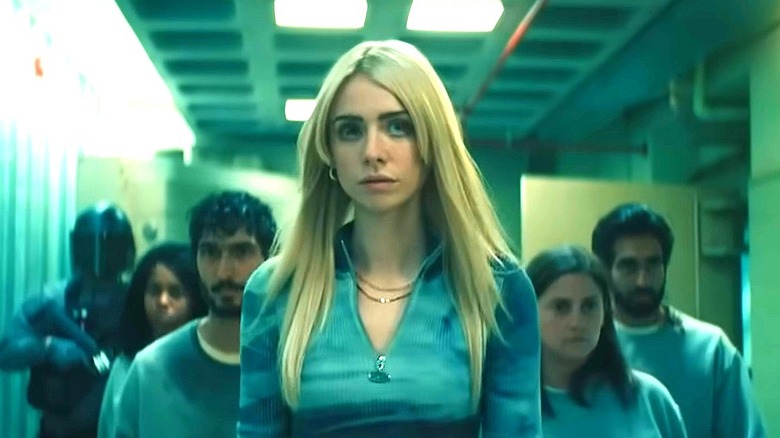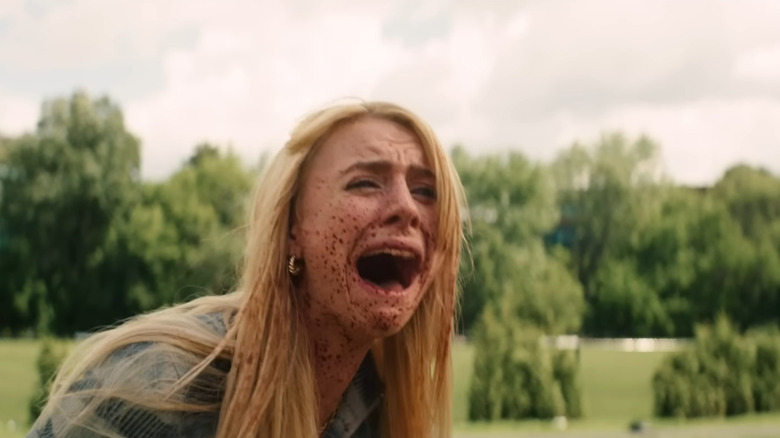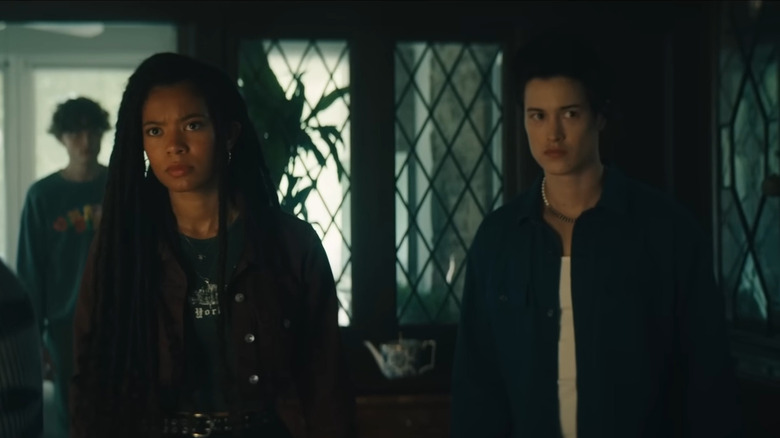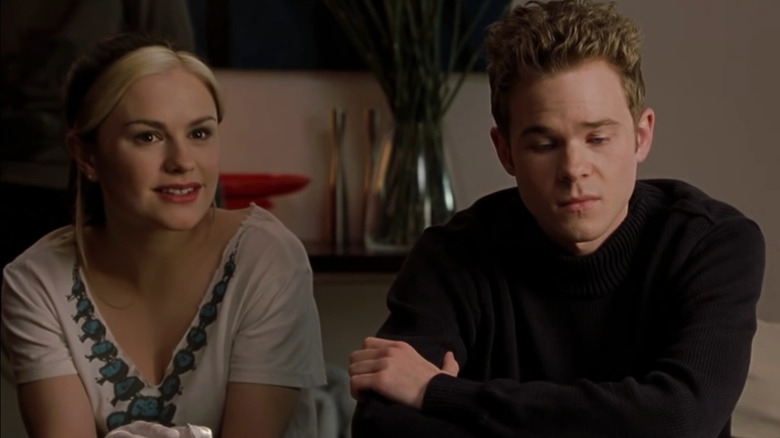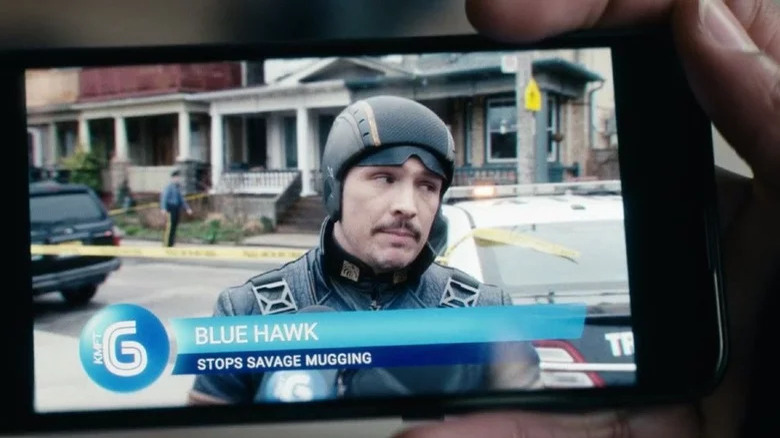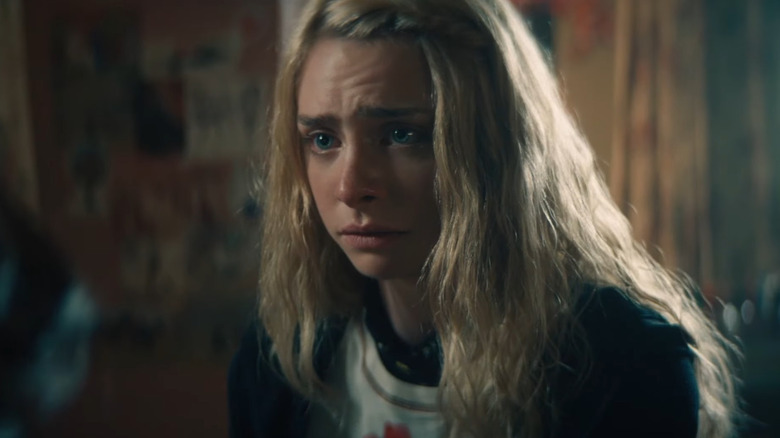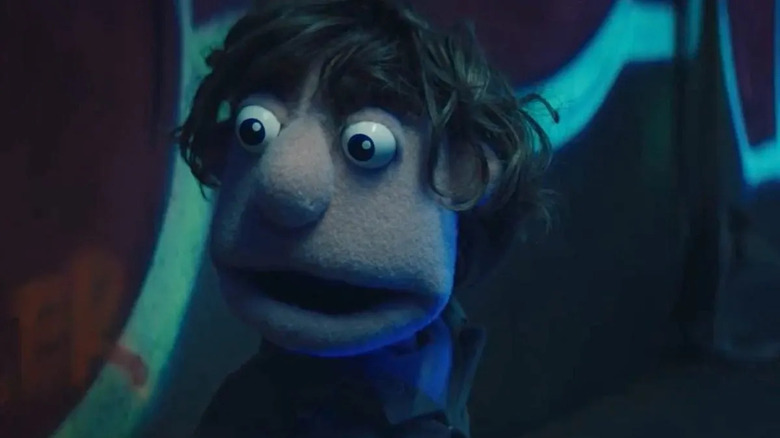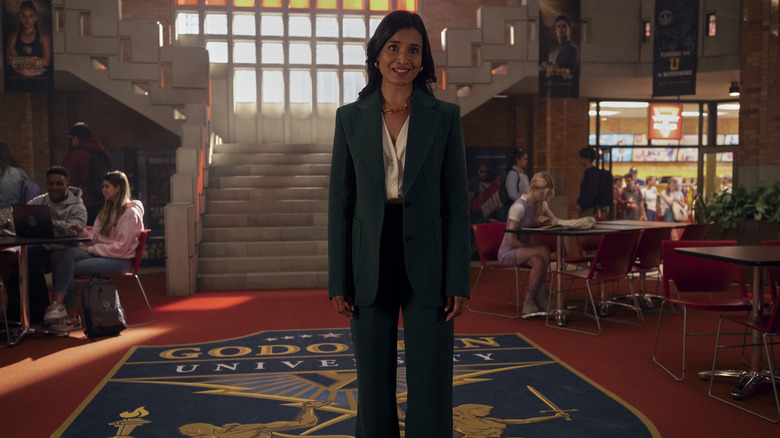Gen V Ending Explained: The Spin-Off Goes First Class
This post contains spoilers for "Gen V" and "The Boys."
Throughout the first six episodes of "Gen V," the show seemed surprisingly self-contained. Sure, you got some cameos from The Deep and some stray mentions of Homelander being on trial, but for the most part it felt like a small-scale conspiracy taking place in a fairly closed-off school. You didn't have to watch "The Boys" to understand it, and it didn't seem like you needed to tune in to "Gen V" to understand season 4 of "The Boys."
This all shifted at the end of episode 6, "Jumanji," which revealed that Dean Indira Shetty (Shelley Conn) has been plotting to build a virus that will wipe out all of the Supes. Immediately, the implications became clear: If she succeeded, this would have massive repercussions throughout "The Boys." Not only could it mean the death of bad Supes like Homelander or The Deep; it would mean the demise of Starlight and Kimiko as well.
Still, for most of "Jumanji" it seemed like the show would stay relatively self-contained. With the core characters reeling from the reveal that Cate (Maddie Phillips) had been betraying them and wiping their memories, "Jumanji" seemed to serve the clear narrative purpose of getting the gang back together. The other characters learned Cate's backstory and were forced to confront their own sins in the process. By the end of the episode, the direction for the rest of the season seemed clear: Cate would redeem herself and — win or lose — they'd all band together for the finale, likely preserving the status quo for "The Boys" in the process. Of course, those next two episodes weren't so simple.
The opposite of wrapping things up
Episode 7, "Sick," ramped things up even more, with Congressman Victoria Neuman coming to campus. For "The Boys" fans, her interactions with Marie, not to mention her actions at the campus town hall, were delightful to watch. Still, there's something a little disappointing about how such a major plot point was wrapped up by a character from another show. "Sick" took the issue of what to do about the virus out of Marie's hands. Marie, however, is our main character; it would've been nice to see how she could've handled it on her own.
"Gen V" may have introduced some fascinating new characters, but in the end, the show isn't really about them. With Neuman taking her own secret dose of the virus and the "Supe Lives Matter" crowd spiraling out of control, it became clear throughout the penultimate episode that the season's main purpose is to set up season 4 of "The Boys." The finale, "Heroes of Godolkin," makes this even more blatant, with both Homelander and Ashley showing up to play major roles.
Things get more muddied with the lack of resolution. The season's final moments involve Cate and Sam getting praised by the press thanks to Homelander, whereas Marie, Jordan, Andre, and Emma are all demonized and locked away. For how long? We don't know. It seems insane that they'd trap them in there for the entirety of season 4, which means we might end up getting a "Mandalorian"/"Book of Boba Fett" situation, in which a cliffhanger in one show is resolved in another.
But is this necessarily a bad thing?
Of course, this is the trade-off with having a small spin-off show to a larger, ongoing series. "Gen V" was always going to have to choose between staying self-contained or sacrificing its larger sense of continuity for the sake of the franchise. Maybe it's good that instead of attempting a nearly impossible juggling act, they opted to firmly choose the latter over the former. Now we know, more clearly than ever, that "Gen V" is not a self-contained thing. There's some relief in the show no longer treading that awkward middle ground.
It helps that "Gen V" offers up a fun subversion of a classic superhero dynamic in the process. In the finale, our group of Supes has splintered off into two camps: those who believe peaceful co-existence with non-Supes is possible, and those who don't. On the anti-peace side of things is Cate, whose powers are strikingly similar to Professor X from the X-Men comics. She can both control people's minds and read them; it's a power that might not seem that dangerous at first glance (especially if you're an X-Men fan who's used to Xavier using the power with good intentions), but it's quickly made her one of the scariest Supes on the show.
At first blush, the obvious Magneto of the pro-peace group is Andre, who can bend metal, but if anything the Magneto parallel here is Marie. She's another bender with a traumatic early childhood that informs her motivations, and she's most strongly positioned as Cate's main foil. With its final episode, "Gen V" asks what would've happened if Xavier and Magneto had switched places. What if "X-Men: First Class," which also focused on a bunch of young adult superhumans, had made Xavier the bad guy instead?
Their own subversion of the X-Men series
Like "X-Men," "Gen V" ultimately takes the stance that peaceful co-existence between Supes and regular humans should be the end goal. Much like how Magneto in "X2" is clearly painted as being in the wrong for trying to murder every single non-mutant near the end, Dean Shelley is portrayed as going too far with her Supe-killing virus. Genocide is never the answer, both shows insist. But the worlds of these franchises are different, and this argument also plays a little differently between them.
After all, the "X-Men" movies portray mutants as a thinly-veiled metaphor for vulnerable minority groups. The 2000s films in particular were clearly focused on the gay rights parallel; it's why so much of "The Last Stand" focuses on the misguided creation of a "cure" for being a mutant, and why "X2" gives us a scene with Bobby and his parents that plays out almost exactly like a coming out scene. (Just replace "a mutant" with "gay," and the whole conversation makes a lot more sense.)
But the series always strained a bit under this metaphor, because the mutants in the "X-Men" movies are legitimately dangerous. There are a lot of reasons why real-life homophobia is bad, but a big one is simply that queer people aren't actually a danger to anyone. But it's hard to blame anyone who's watched Magneto casually destroy the Golden Gate Bridge for concluding that mutants truly are a serious threat, nor is it easy to blame Hughie for hating Supes after one of them accidentally exploded his girlfriend. "Gen V," meanwhile, exists in a franchise that treats its superhuman characters more as powerful, privileged elites, not a persecuted minority.
Supe Lives Matter
"The Boys," at its core, has always been an anti-cop show. As the sudden prevalence of the "Supe Lives Matter" slogan in season 3 made clear, the best real-world parallel for the Supes is the police. Most of the Supes we meet are "crime fighters" who are rarely held accountable for their actions, are passively excused by the press, incapable of properly owning up to their mistakes, and will regularly indulge in revenge fantasies and cozy up to white supremacy. Even the good Supes like Starlight and Queen Maeve are characters who basically play the role of disillusioned cops, who've repeatedly tried and failed to change a broken system from within.
So when the college Supes in "Gen V" at Victoria Neuman's debate last week start complaining about how they're a persecuted minority, it rings a little hollow. The most prominent character among them is Rufus, the campus date rapist, after all. The Supes trapped in The Woods might genuinely be mistreated, but these Homelander fans cheering on Supe Power are not one of them. They're a parody of white conservatives as the show's left-wing writers see them: People who have it all, who genuinely think they're better than everyone else, yet still have the nerve to self-righteously declare themselves victims.
It's a lot easier to see Cate's rampage in the season finale as villainous in this context; after three seasons of "The Boys" and one season of "Gen V," it feels like, if anything, most Supes in this universe have been treated far too leniently. Most of them aren't persecuted minorities; they're a powerful group of people who've got most of the media and corporations on their side.
Or are they?
But as "Gen V" has made abundantly clear, this situation's a little more complicated than that. For every Andre out there who can accidentally slice a woman's neck at a bar and walk away from it with zero consequences, there's a Supe like Sam who's spent his whole childhood being tortured and imprisoned for things mostly out of his control. Even Homelander, who has served as the perfect argument for why ultra-powerful Supes should never have been made at all, is still the way he is because of how horrifically he was treated in his early childhood. He may be the epitome of entitlement now, sure, but in his early years, he was denied a lot of basic human rights.
Likewise, both Cate and Sam, the two characters who've come out most strongly in favor of "Supes' rights," are the two who've been wronged the most. Cate was rejected by her parents for powers she had no control over, powers that her parents gave her without her knowledge or permission. Sam's motivations are obvious: He's been mistreated into near-insanity for years, and even having a widely beloved older brother wasn't enough to spare him. Although the franchise has made it clear that Supes in this universe genuinely need more government restrictions in order to keep everyone safe, the treatment of both Cate and Sam was genuinely terrible. Like Magneto before them, their motives are perfectly understandable even if their actions are clearly over the line.
The tragedy of Cate and Sam
The finale's final moments have Homelander swooping down and settling things the way he wants it. That means Cate and Sam are being paraded as heroes, and the pro-Supe movement is now stronger than ever. It's tragic because as sympathetic as Cate and Sam's motives might be, we know that their cause will almost certainly be overshadowed by Homelander's self-serving, fascist ideology. We don't know how much Cate and Sam will get to interact with Homelander in "The Boys" season 4, but it's easy to picture them both growing disillusioned with the cause the more they interact with the guy. As much as some Supes might genuinely be a persecuted minority in this universe, Homelander's "Supe Lives Matter" movement has clearly been a metaphor for the Alt-Right from the very beginning, and it's not clear if Cate will be down with that for very long.
There's also something particularly tragic about Sam's development, as he is introduced to this group of Homelander fanboys at the worst possible time. After a lifetime of being tortured for who he is, Sam is introduced to a guilt-free, celebratory way of living, one without any of the complications involved with Emma's more nuanced, non-genocidal approach. Cate using her powers to make him "feel nothing" about the destruction he's causing is particularly fitting, as this is the approach that Homelander's philosophy basically requires. Like any hate movement founded on the demonization of other people, its followers pretty much have to cut themselves off from any self-reflective emotions to continue doing what they're doing. By asking Cate to take away his guilt, he's actively taking part in the willful blindness towards human suffering that so many hate movements are built upon.
One potential wild card left: Dean Shetty
The big question "Guardians of Godolkin" refuses to address is exactly what went down with Cate and Shetty in the penultimate episode. In "Sick," we saw the two talk for a bit, and it genuinely seemed like Shetty had won Cate back over to her side. All they needed to do, Shetty said, was give "one last push" and then "we can leave all of this behind." But the next time she and Cate were on screen, things were completely different. Cate mentally forced Shetty to explain everything to the others, and then she forced Shetty to slit her own throat right in front of them. It's an action that mostly makes sense given what we've seen of the character so far, but it still feels like something's missing. It feels like we skipped a scene between the two that fills in this gap, but we just don't know what it is.
The fandom was filled with theories over the week-long wait, like how maybe Shetty wasn't dead and that Cate had simply given everyone else a fake vision. The finale doesn't address these theories at all, which makes us wonder if they're holding onto some big Shetty-related reveal for a later date. Maybe this is one of those "Snape kills Dumbledore" situations, and Cate is furthering along Shetty's agenda while pretending to be on the opposite side. After all, if anything could convince Vought and the government to see the wisdom in wiping out the Supes like Shetty wants, the events at Godolkin University this episode would certainly be it. Cate might seem like this universe's Magneto with Professor X's powers, but the "Gen V" finale still leaves the possibility of her character being even more complicated than that.
